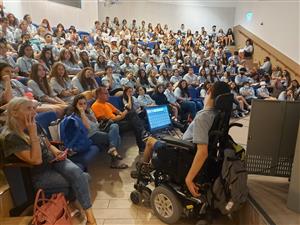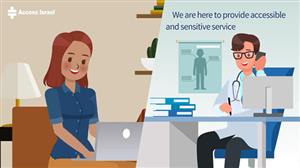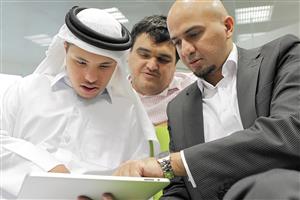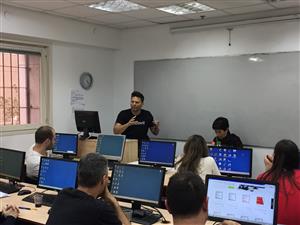Search Results
Search
Filter results
Advanced Filters
Your search returned 190 Solutions
-

Comprehensive support for young people with disabilities after their school education
Krembo Wings from Israel initiated the ‘Paving the Way to Independent Life’ programme in 2002 to support people with disabilities after their schooling and to help them develop soft skills and life skills. Managed by people both with and without disabilities, the programme benefits around 250 young graduates each year.
Krembo Wings, Paving the Way to Independent Life programme, Israel -
Supporting school enrolment of girls with disabilities
STEP identified 220 girls with disabilities for school enrolment and provided 180 of them with assistive devices. The project was implemented with the support of parent-teacher councils and school representatives in two districts. STEP also trained 90 teachers in methods for teaching children with disabilities.
STEP - Special Talent Exchange Program, Girl Enrollment Programme, Pakistan -
Inclusive Education for Cambodian children who are blind or deaf
The project offers extra classes for children with visual or hearing impairments to enable them to attend mainstream schools. During the extra lessons students are prepared to follow regular classes by making use of special learning materials in Braille and sign language. The project also created the Khmer Braille and Khmer Sign Language.
Krousar Thmey Foundation, Cambodia -
Sign bilingual education from infancy to secondary school
Deaf and hearing students study together in the same classroom, receiving sign language and oral instructions simultaneously. The courses are available in signed and spoken languages, using Hong Kong Sign Language, Cantonese, Mandarin, and English. In 2019, 124 deaf children enrolled in the programme.
Chinese University of Hong Kong, Centre for Sign Linguistics and Deaf Studies, Sign Bilingualism and Co-enrolment in Deaf Education Programme, China -
Supporting businesses in creating accessible workplaces and infrastructure
Based in Karachi, Pakistan, NOWPDP started a comprehensive project for public space and workplace accessibility and inclusion in 2012. Since then more than 50 locations have been adapted. To date more than 2,000 people with disabilities have benefited, 30 branches of a bank and numerous offices have been modified.
NOWPDP - Network of Organizations Working with People with Disabilities, Pakistan -

Quick rollout of guidelines on how to treat patients with disabilities in pandemic times
Accessible Emergency Services was launched by Access Israel, a leading NGO, to provide health care providers with guidelines and videos for interacting – both remotely and in person – with COVID-19 patients with disabilities. The programme has already expanded to other emergency services and vital services organizations.
Access Israel, Accessible Emergency Services, Israel -
The BCA Universal Design Mark (UD Mark) accords recognition to the building owners and designers who go beyond the code compliance to create user-friendly buildings. It allows assessment of projects at design stage, thereby facilitating the incorporation of UD principles from the onset of project development.
To support an inclusive environment, the BCA launched the Accessibility Master Plan. The UD Mark is part of this and provides a two-stage assessment process: upfront credit for the concept design and subsequent award affirmation when the development is completed. A "self-help" checklist makes UD more tangible and easier to implement.
BCA - Building and Construction Authority, Certification scheme for Universal Design, Singapore -
Cross-sectoral effort to build accessible homes for people with disabilities in poverty
Puspadi Bali operates a housing project in Bali for people with physical disabilities living in poverty. The houses are built after an individual evaluation and in collaboration with Warmadewa University and Journeyman International, an NGO focusing on architectural services in a humanitarian context.
PUSPADI Bali, Accessible Housing, Indonesia -

Mada, a public-private partnership in Qatar, is a one-stop-shop for all accessibility technologies for persons with disabilities. It offers direct services, works on website accessibility certificates and establishes a library of accessible books. Currently it is beginning to influence regional services in other Arabic-speaking countries.
As well as delivering direct services, Mada has sought to introduce a range of technology to support Arabic speakers, introducing website accessibility certification, establishing the first major repository of accessible books online for Arabic users and supporting Arabic innovation and research in access technologies.
Mada Assistive Technology Centre, One-stop-shop for accessibility technologies in Qatar, Qatar -

Training people with psychosocial and intellectual disabilities for ICT jobs
TAP was designed for people with mental, emotional, or cognitive disabilities. It includes technological education, training of soft skills, and the placement of people as qualified IT specialists. Since its launch in 2011, TAP has trained more than 150 adults, 74 per cent of whom were successfully placed.
itworks, Technology Accessibility Program (TAP), Israel